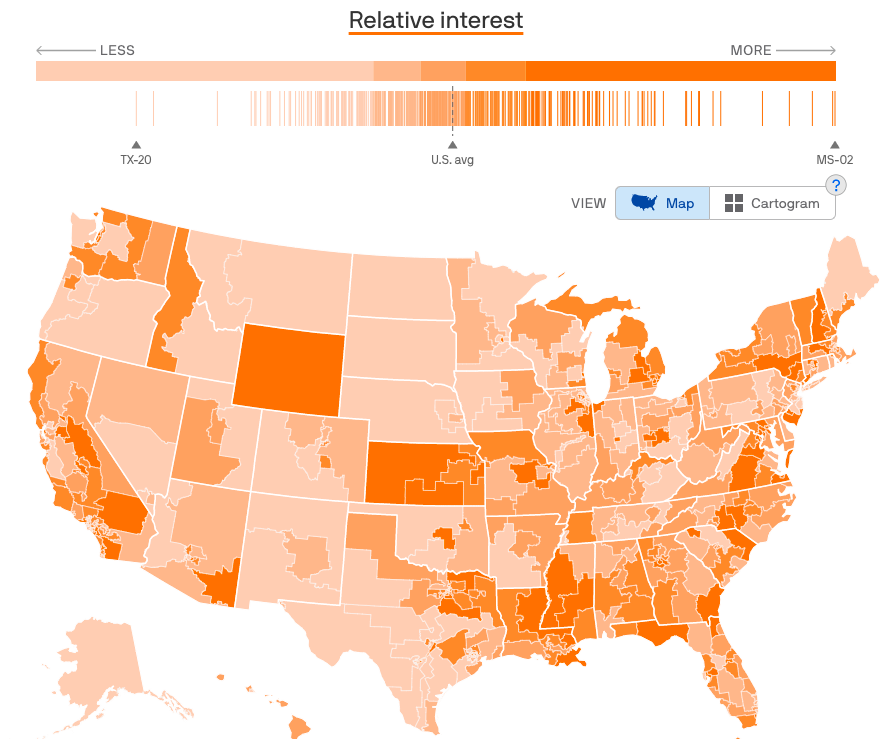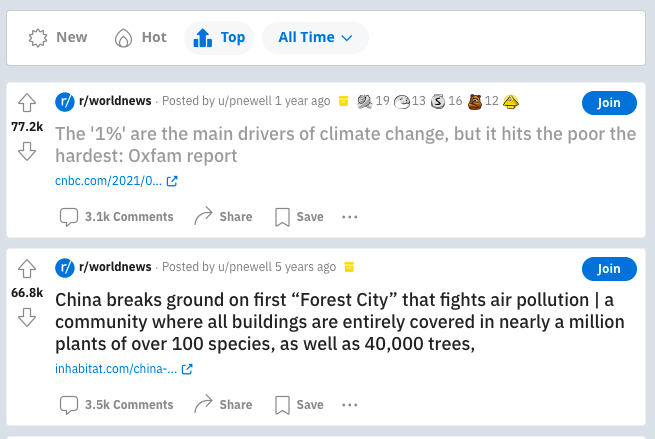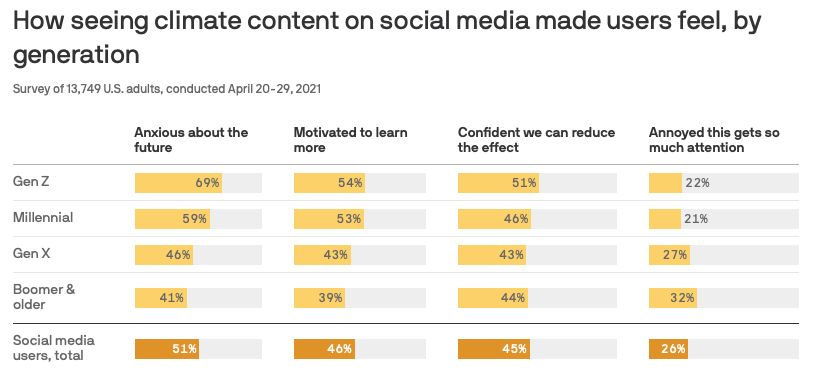Resources
Search below for resources covering the intersection of climate engagement, social science and data analytics.
RESULTS
News Platform Fact Sheet
Today, an overwhelming majority of Americans get news at least sometimes from digital devices. A large majority of U.S. adults (82%) say they often or sometimes get news from a smartphone, computer or tablet, including 49% who say they do so often. This is similar to the 51% who said they often got news from digital devices in 2021, but lower than the 60% of those who said the same in 2020. When asked which of these platforms they prefer to get news on, about half of Americans say they prefer a digital device (53%), more than say they prefer TV (33%). Even fewer Americans prefer radio (7%) or print (5%). Among digital platforms, news websites or apps are also the most preferred source for news: About a quarter of U.S. adults (23%) prefer to get their news this way, compared with 13% who prefer social media, 12% who prefer search and 4% who say they prefer podcasts.
Poll: What Do Video Gamers Think About Global Warming?
Americans who play video games are generally more personally concerned about climate change than the rest of the country, making them good targets for appeals to take action. About three in four video gamers (73%) think global warming is happening, and the majority of video gamers (56%) understand that global warming is mostly human-caused. These proportions are nearly identical to the proportions in the U.S. population overall, as measured in the Climate Change in the American Mind study conducted in April and May of 2022 (72% believe global warming is happening, 56% believe it is human-caused). Seven in ten video gamers (70%) say they are either “somewhat” or “very” worried about global warming, compared with 64% of the U.S. population overall. About half of video gamers are at least “moderately confident” that people from the gaming community, working together, can affect what local businesses (52%), corporations (52%), their state government (50%), the federal government (49%), or their local government (48%) does about global warming.
This tool shows which issues are most salient in which congressional districts, using Google search data. The tool allows users to search by issue (e.g., abortion, gas prices) and by congressional district. The current data online is from June 6-13, and jobs, taxes, gas prices, firearms, and wages are receiving the “most interest,” while abortion is receiving “medium interest.” Users can see issue salience/interest by absolute or relative interest.
Talking Data Equity with Dr. Mareike Schomerus
Any kind of data may be less objectively interpretable than it may seem. Scientific processes and “facts” have always been created by humans who exist in power structures and have biases. Creating quantitative data that cover an entire population is a good step toward capturing relevant evidence about all groups, but we should still be careful to understand the biases we use to interpret data points and categories they’re put in. Dr. Mareike Schomerus is Vice President at the Busara Center in Nairobi. In this video, she shares her experiences with practical ways to design research and use data in ways that are both good science as well as grounded in local reality.
Political Tech Landscape Report 2021
2021 saw significant activity across the political tech space. This report describes relevant developments and trends. Social media platforms imposed limitations on individual targeting for political ads, forcing campaigns to explore alternative influencer-focused messaging strategies. Given recent underperformance at the ballot box, stakeholders dedicated more resources to studying the rightward shift of the Latinx voter base. Headlined by the acquisition of NGP VAN’s parent company EveryAction, merger and acquisition activity notably increased, demonstrating the growth and maturation of the political tech market. A small number of campaigns began to accept cryptocurrency donations, responding to our nation’s growing interest in emerging Web3 technologies.
submitted by pnewell
Climate content on Reddit has gotten lots of attention over recent years. This resource includes 9 years worth of the “most successful” content (by most upvotes) posted on Reddit by Phillip Newell of Climate Nexus. The top post, for example, is “The '1%' are the main drivers of climate change, but it hits the poor the hardest: Oxfam report” (77.2k upvotes).
The 2022 Tools & Tech Guide
State Voices' 2022 Tools & Tech Guide has the latest digital tools and vendors, including texting services, cell-compliant dialers, digital organizing, online fundraising, relational organizing, digital marketing, advocacy, and bill tracking. This resource is the result of multi-year research from State Voices' Data and Technology Department. You can also learn more about technology recommendations for essential items like office chairs, laptops, webcams, docking stations, headphones, scheduling tools, computer monitors, and security software.
Tipsheet: The 11-Point Guide to Getting Started with Digital Tools
Figuring out where to start with digital tools can be daunting. Check out these practical tips for moving forward incorporating digital tools into your climte advocacy work. Here are the first three tips – open up the tip sheet to see more!
Poll: On social media, Gen Z and Millennial adults interact more with climate change content than older generations
- Among U.S. social media users, 45% of Gen Z adults and 40% of Millennials have interacted with content on social platforms that focuses on the need for action on climate change by following an account, liking or commenting on a post, or posting or sharing content about the need for action on climate change.
- Majorities of Gen Z (69%) and Millennial social media users (59%) say it made them feel anxious about the future the last time they saw content on social media about addressing climate change. Fewer than half of Gen X (46%) and Baby Boomer and older social media users (41%) say they felt this way the last time they saw climate content.
- Generations also differ when it comes to positive emotional reactions: 54% of Gen Z and 53% of Millennial social media users say they felt motivated to learn more about climate change issues the last time they saw climate content on social platforms, compared with 43% of Gen X and 39% of Baby Boomer and older users.
- Among climate-engaged social media users, 73% favor phasing out the production of new gasoline-powered cars and trucks by the year 2035, and 54% think the U.S. should phase out the use of fossil fuels in energy production entirely. By contrast, much smaller shares of social media users who do not engage with climate content support either of these two proposals (39% and 27%, respectively).
2021 M+R Benchmarks Study
Every year M+R Strategies, a digital services firm for progressive non-profits, releases its Benchmarks Study. The 2021 version analyzes the nonprofit digital advocacy and fundraising field using data from over 220 participating organizations. The Study covers these areas:
- Digital advertising
- Email messaging
- Mobile/SMS messaging
- Social media
- Fundraising
- Membership
- Website traffic and useage
Pagination
- Previous page
- Page 2
- Next page







